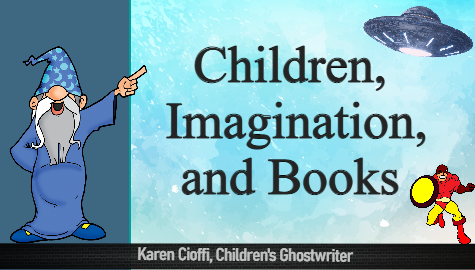Getting into the topic of children, imagination, and books, it's important to understand what imagination is.
In an article at Psychology Today, Jim Davies, Ph.D. says, “Imagination is quite possibly a uniquely human ability.” (1)
Now, I’m a children’s writer, and I primarily write fiction and fantasy. I’ve never once considered the imagination as being something unique to humans.
Davies goes on to explain ‘imagination’ better than any other definition I have seen. “In essence, it allows us to explore ideas of things that are not in our present environment or perhaps not even real. For example, one can imagine the cup of coffee seen the day before or an alien spaceship arriving in the earth's orbit.”
What’s important to understand is that this kind of magical experience comes from within us rather than from outside factors.
Not everyone will experience the same imaginative thoughts or ideas upon seeing or hearing the same thing.
So, with this in mind, let’s go over why fostering a child’s imagination is essential and how books can help.
Imagination plays a crucial role in the development of children. It’s a fundamental cognitive and creative ability that helps them make sense of the world. It helps them learn, problem-solve, and express themselves.
Imagination allows a child to become a part of journeys to other lands and worlds. It enables them to see beyond the realm of reality.
Books play a crucial role in nurturing a child’s imagination.
Books transport children to new worlds, introduce them to characters and places they might never encounter in real life, and expose them to different cultures and perspectives.
A child can be an inventor, a princess, a pirate, a sailor, or a space explorer soaring through the universe. The scenarios are limitless.
Books can also expose children to real-life situations, like bullying, losing a loved one, diversity, anxiety, friendship, and so on.
And this exposure further fuels their imagination.
Here are some key aspects of the relationship between imagination and children:
Cognitive Development:
Imagination is closely tied to cognitive development in children. It involves the ability to form mental images, ideas, and concepts that are not directly tied to sensory input. This helps children explore new ideas, think abstractly, and engage in symbolic thought.
Books create this environment.
Social Development:
Reading fiction books brings children into different real-life scenarios. It allows children to develop social and emotional skills. Through books, children can learn about cooperation, negotiation, and communication. It helps them understand different perspectives.
Creativity:
Reading encourages creativity, and imagination is a cornerstone of creativity.
When children read about imaginative scenarios, they are inspired to create stories, draw pictures, or even act out scenes from the books. This creativity is essential for cognitive development.
Empathy:
Through books, children can put themselves in the shoes of various characters and understand their feelings and experiences. This encourages empathy and a deeper understanding of the human experience, a form of emotional imagination.
Critical Thinking:
Reading books challenges children to think critically. They are exposed to different situations, conflicts, and resolutions. This, in turn, sharpens their problem-solving skills and helps them imagine alternative solutions to real-life issues.
Self-Confidence:
When children use their imagination, they gain a sense of control and agency in their play. This can boost their self-confidence and self-esteem as they become the creators and directors of their own imaginative worlds.
Vocabulary and Language Skills:
Reading books introduces children to new words and language styles. This exposure expands their vocabulary and language skills; these skills are essential for effective communication and expressing ideas.
Cultural Awareness:
Books can introduce children to different cultures, traditions, and belief systems. This broadens their horizons, helping them imagine the diversity of the world and encouraging tolerance and open-mindedness.
This can also help children embrace and promote cooperation, negotiation, and communication.
Escape, Comfort, and Stress Relief:
For many children, books offer an escape from the real world, especially during difficult times. Immersing themselves in a story can provide comfort and a source of stress relief. This allows them to imagine a different reality, even if just temporarily.
Creative activities like reading books provide a safe place for children to explore and understand their feelings and the world around them.
Education:
Books are a fundamental educational resource. They provide knowledge, inspire curiosity, and stimulate children's thirst for learning, which is closely tied to imagination.
Parent-Child Bond:
Reading with a younger child can create a strong bond between parents or caregivers. It's a shared imaginative experience that fosters a sense of security and attachment.
Summing It Up
Books are powerful tools for nurturing the imagination of children. They offer a gateway to diverse worlds, encourage creativity and critical thinking, and provide a host of educational and emotional benefits.
To support and encourage a child's imagination, parents and educators can provide them with opportunities for creative play, access to books and art supplies, and exposure to diverse experiences.
Creating an environment where children feel safe and free to express themselves and explore the world and their imaginative abilities is vital.
And just as important as all this, if not more so, children love being taken on amazing adventures and journeys through their imaginations. Books accomplish this.

I’m a working children’s ghostwriter, rewriter, editor, and coach. I can help turn your story into a book you’ll be proud to be the author of, one that’s publishable and marketable.
OTHER HELP I OFFER:
FICTION WRITING FOR CHILDREN COURSE
A guided self-study course and mentoring program.
HOW TO WRITE A CHILDREN’S FICTION BOOK
A DIY book to help you write your own children’s book.
You can contact me at: kcioffiventrice@gmail.com. Or give me a call at 347—834—6700. (Please leave a message- I’ll get back to you as soon as I can.)

